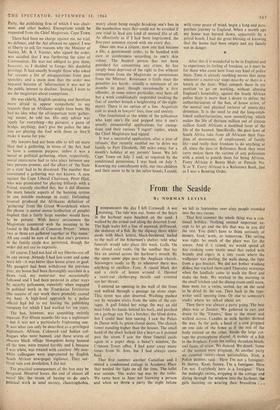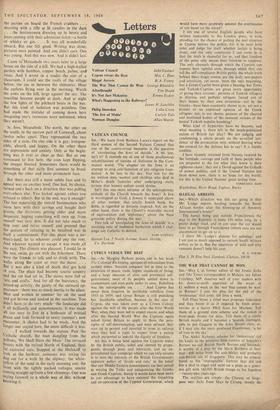From the Seaside
By NORMAN LEVINE IREMEMBERED the day I left Cornwall. A wet morning. The tide was out. Some of the boats in the harbour were beached on the sand. I walked by the urinal and along the deserted front. The high water left a line of seaweed, driftwood, the skeleton of a fish. By the slipway three white cards with black letters, black-bordered, nailed to the wall of the fishermen's shelter, told what funerals would take place this week. Gulls. On the closed café roofs. On the sandbar that lay like an animal across the harbour's mouth. By the open sewer pipe near the Anglican church. Scavengers ready to fly to wherever there was anything to swallow. Eyes. A round black dot and a circle of lemon around it. Opened a razor-cut clothes-peg mouth and vomited out her throat.
I entered an opening in the wall of the front and, walked through a passage up stone steps. This street was also deserted. Washing pushed out by wooden sticks from the sides of the cot- tages. A gull folded her wings the way an old man folds his hands behind his back, and perched on a garbage can. Past a butcher, the blind down, but I could hear him sawing. I saw the Palais de Danse with its green closed doors. The church tower standing higher than the houses. The small hand of the clock looked like a heart as it pointed past the seven. I saw the three funeral cards again in a paper shop, a baker's window, the Crimson Tours office. I had gone away many times from St. Ives, but I had always come back . . .
That first summer another Canadian and I rented a condemned cottage in Academy Place that needed the light on all the time. The toilet was outside. The water tap was by the toilet. We came here in June not knowing a person and when we threw a party the night before we left in September over sixty people crowded into the two rooms.
That first summer the whole thing was a con- tinual holiday. Nothing seemed important ex- cept to let go and the life that was in you did the rest. You didn't have to think seriously of money, food,' work, or tomorrow. The setting was right. So much of the place was for the senses. And if it rained, we would spend all day cooking some exotic meal that ended with brandy and cigars in a tiny room where the wallpaper was peeling, the walls damp, the light from a gas bracket. We did not bother washing dishes, but stacked them. until Thursday mornings when the landlady came to wash the floor and make the beds. We worked in the morning in the small kitchen and the dining-room until noon, then went for a swim, surfed, lay on the sand to be dried by the sun. Then back to the type- writer until opening time. Or else to someone's studio where we talked about art.
Then there was always a party going. The best place was at Zennor. We gathered in cars and drove to the 'Tinners,' then to the moor and walked across. Candles in milk bottles showed the way. In the path, a head of a cow propped on one side of the fence as if the rest of the body existed on the other. Inside the large cot- tage the gramophone played. A mobile of a fish in the fireplace. From the ceiling shrunken heads, owl faces, of straw. We danced. We drank. Some of the women were pregnant. At another party we counted twenty-three nationalities. Stish, a Polish painter, said: 'Here I'm not a foreigner. In Surrey, Kent, Sussex, I'm a foreigner. Here I'm not. Everybody here is a foreigner.' Then the midnight swims,, stripping in the cottage and diving through the window into the harbour, the girls insisting on wearing their brassieres . . .
the parties on board the French crabbers . . . shooting with a rifle at lit candles in the dark . . . the businessmen dressing up in berets and jeans coming with their admission ticket—a bottle of whisky or gin. . . . It was all wonderfully absurd. But one fell good. Writing was done; pictures were painted. And one didn't care. One was young. And this was new. And it didn't last.
Came to*"Mousehole two years later to a large house on the side of a bill. We had a high-walled garden with bamboo, copper beech, palms, anal roses. And I wrote in a studio the size of a classroom. I could see the roofs of the village below, the sea in between the chimneys. Hear the curlews flying over in the morning. Watch the cows on the hill, large against the sky. The coastline became purple at dusk. And at night the few lights of the pilchard boats in the bay. But this kind of isolation was pointless. One had made the mistake of coming down here imagining one's resources were unlimited, when they weren't.
St. Ives. Mousehole. The north, the other on the south, in the narrow part of Cornwall, about twelve miles apart. They represented the two sides of a coin. On dne side it is gay, irrespon- sible, absurd, and happy. On the other there are depressions and anxiety. Only at the begin- ning was it ever as clear as that. But as one Continued to live here, the coin kept flipping, the images blurred. Sometimes there would be something of that early first summer to break through the other and more permanent face.
But there was still a more subtle face and its appeal was on another level. One had, by choice, turned one's back on a direction that was pulling everywhere else. You kicked against values you refused to inherit. But in the end, was it enough? The line separating the retired businessmen who came here with their savings and bought their graves, the divorcees getting older and more desperate, hoping something will turn up,. from oneself was very thin. It did not take much to step over and retire oneself and pretend that the gesture of refusing to be involved was in Itself a commitment. For this place was a no- man's-land, let to whoever could pay the rent. And whoever wanted to escape it was made all too easy. The climate was pleasant. I could lie in the sun, swim, go out with the fishermen. There were the friends to talk and to drink with. The Walks along the coast or over the moor. . . . But it was also a kind of death that got hold of you. The place had become tourist country and the rot had set in. The stores were full of arts and crafts.' And for all the buoyancy, the Jazzed-up activity, the gaiety of the outward ap- Pearance—there was so much inertia to the place. Men and women in summer lay on the sand and got brown and soaked in the sunshine. You didn't have to do very much—the landscape did R all brilliantly and monotonously. It was made all too easy to live in a hothouse of mutual Praise and look forward to every summer's new encounter. A choice had to be made. And the longer one stayed here, the more difficult it was.
. . I walked towards the station. Past the Catholic church, the man dangling from the gallows, `We Shall Have the Mass.' The terraced houses with the retired North of England, their fat castrated cats. Stopped at the Malakoff to look at the harbour, someone was taking his dog out for a walk by the slipway; the white- Yellow of the sand in the early morning sun; the front with the tightly packed cottages, smoke coming straight up from a few chimneys. One was Saying farewell to a whole way of life; without knoWing it.



































 Previous page
Previous page